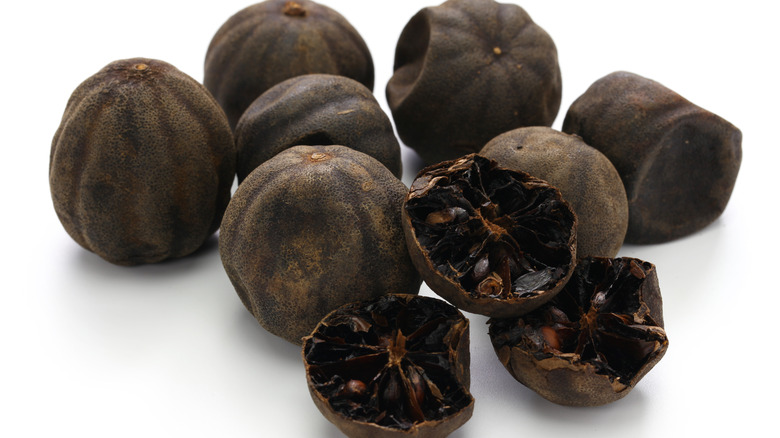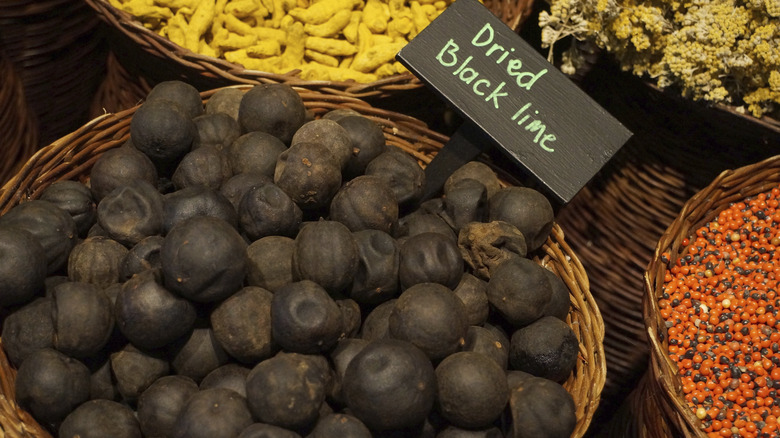What Are Black Limes And What Do They Taste Like?
From the fruit genus that brought us blood oranges, Buddha's hand lemons, and finger limes comes another curious creation of the citrus variety. Originating in Southeast Asia, it's said that citrus fruits migrated throughout the world by way of intercontinental trade and monsoon flooding, according to Nature. Generations of cultivation and cross-breeding between primitive lemons, mandarins, and pomelos led to the vast diversity of citrus fruits we have today, ranging from the picturesque to the outright bizarre.
As one of the black sheep of the citrus family, black limes are distinguished by their gothic, dark leather-clad exteriors and internal feeling of emptiness (literally, they feel hollow). Used either whole or ground, black limes add a punch of flavor to food and drinks unlike any of their ostentatiously vibrant siblings. Oddly enough, black limes aren't really a species of citrus but rather the product of traditional fruit preservation that allowed limes to be used as a spice for flavor and aromatics (via Cookist).
What is a black lime?
When limes made their way into the Mediterranean around the 10th century, the Persians developed a method for processing and preserving limes that have been integrated into food cultures across the Middle East (via Specialty Produce). Black limes (also limu Omani in reference to their ancestral city of Oman) have been blanched and dehydrated. Essentially they are salt-cured and air-fermented, causing their skin and inner flesh to turn dark, hard, and brittle (via Fine Dining Lovers).
Making black limes begins with fresh limes (typically Mexican, Persian, or key limes) and a boiling salty brine, though some recipes like Persian Good may call for some vinegar for good measure. Limes are only blanched in the brine for about a minute before they are transferred to an ice bath. But after the ice bath, the limes are patted down and traditionally left to sun-dry on banana-leaf mats for days (or weeks) until they shrivel and change color, according to Fine Dining Lovers. If you don't have banana leaves and consistent dry weather at home, a dehydrator or oven on a very low-temperature setting may help speed up the process. According to Specialty Produce, the resulting black limes are said to have a pungent aroma with a concentrated tart citrus flavor with subtle fermented or musky notes.
Powdered, ground, or whole?
As a ground powder, black limes are a dynamic spice that can be used in nearly all forms of cooking to add a blast of tangy, smokey, funky flavor. Prominently used in tagines, black lime powder is frequently featured in seasoning meat, not just for the flavor but for the magical marinating effect of citrus on breaking down fats (Food and Wine). Whole black limes are also often simmered in broth for soups and stews to help boost the dish's aromatics. When cooking with whole black limes, it's important to pierce the lime's skin so it can fully interact with the cooking liquid. The dehydrated lime will immediately start soaking up the cooking liquid, but at the same time, it'll exhale its unique flavor to impart to the overall dish.
When coarsely ground or sliced, black limes can be steeped in hot water to make tea or mixed with water, sugar, and ice to make limonana (according to Food and Wine). Lately, black limes have seen a resurgence in the west due to mixologists branching out to find the next celebrity spice or garnish to add to their cocktails. One beverage director in Chicago worked to create a line of cocktails featuring shaved black lime paired with aged rums and mezcal (via Tales of the Cocktail). If you have the urge to spice up your next margarita night, black limes might just be the zest you're looking for.


